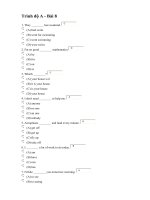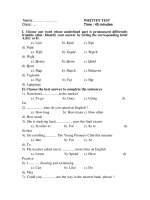- Trang chủ >>
- Khoa Học Tự Nhiên >>
- Vật lý
Tiếng anh 7-UNIT 8 - ACLOSER LOOK 1
Bạn đang xem bản rút gọn của tài liệu. Xem và tải ngay bản đầy đủ của tài liệu tại đây (121.66 KB, 2 trang )
<span class='text_page_counter'>(1)</span><div class='page_container' data-page=1>
<i><b>GIÁO ÁN TIẾNG ANH 7 THÍ ĐIỂM</b></i> Giáp Thị Khâu
<i><b>Week</b></i><b> : 22 </b><i><b>Period</b></i><b> : 62</b>
<b>Unit 8</b>
<b>: </b>films
<b> Lesson 2: A closer look 1 Pages 18-19</b>
<b>Objectives: By the end of this lesson, students will be able to pronounce correctly the </b>
sounds /t/, /d/ and /id/ in isolation and in context; use vocabulary related to the topic
“Films”.
<b>Teaching aid: textbook, cassette.</b>
<b>Procedure:</b>
<b>CONTENT</b>
<b>Unit 8</b>
<b>:</b><sub> films</sub>
<b> Lesson 2: A closer look 1 Pages 18-19</b>
<b>I/ NEW WORDS.</b>
-hilarious (adj) vui nhộn, hài hước
-gripping (adj) thú vị, hấp dẫn
-scary (adj) sợ hãi
-moving (adj) xúc động
-violent (n) có nhiều cảnh bạo lực
-entertaining(n) thú vị, làm hài lòng
-disappointed (adj) thất vọng
-terrified (n) cảm thấy khiếp sợ
<b>II/ FORM: “ed</b> and <b>–ing</b> adjectives” (page 18)
<b>Ex 1: He is an interesting boy. I’m interested in talking to him</b>
<b>Ex 2 : I’m bored with the film. It’s boring</b>
<b>=> When do we use ing/ed adjectives?</b>
<i>+ We use –<b>ing adjectives</b> to describe people or things<b>.( mô tả người / vật)</b></i>
<i>+ We use <b>-ed adjectives</b> to talk about our feeling<b>.( nói về cảm giác của chúng ta)</b></i>
<i><b>Choose the correct adjectives</b></i>
<b>Key:</b>
1. Moving
2. Frightened
3. Disappointe
d
4. Amazed
5. Terrified
</div>
<span class='text_page_counter'>(2)</span><div class='page_container' data-page=2>
<i><b>How do we pronounce the -ed endings?</b></i>
<b>+ /Id</b><i><b>/ after sounds /d/ and /t/</b></i>
<i><b>+ </b></i><b>/t/</b><i><b> after unvoiced consonants /p/, /k/, /f/, /s/, /</b></i>ʃ<i><b>/,/t</b></i>ʃ<i><b>/</b></i>
<i><b>+ </b></i><b>/d/</b><i><b> after voiced consonants, vowels /m/,/n/,/i/, /e/…</b></i>
<i><b>EX:</b></i>
/t/: watched, danced, walk...
/d/: played, bored, closed...
/id/: wait, needed, hated...
<b>...THE END...</b>
<b>EXERCISES:</b>
<b>I/ Choose the corect adjective: </b>
1. The end of the film was so moved / moving
2. The boy was so frightened / frightening by the film that he couldn’t sleep last night
3. Critics were disappointed / disappointing at his performance as Kinh Lear .
4. I am amazed / amazing that he has won Two Oscars for Best Actor
5. We were terrified / terrifying of the ending of that horror film .
<b>II/ Choose the best answer (A, B, C or D).</b>
1. There is an ………football match on TV tonight
A. exciting B. excited C. excite D.excitedly
2. Choose the word which has the different pronunciation of the underlined part
A. stayed B. Enjoyed C. Repaired D. visited
3 When he got mark 2 in English, he was …………
A. surprise B. Surprising C. Surprised D. surprisingly
4. Choose the word which has the different pronunciation of the underlined part
A. promised B. Weighed C. laughed D. coughed
<b>HOMEWORK:</b>
<b>Consolidation</b>:
- Learn new words by heart.
- Do exercises 1,2 p.18
</div>
<!--links-->









